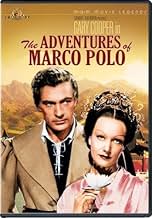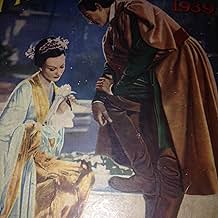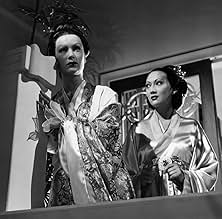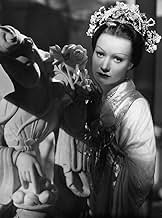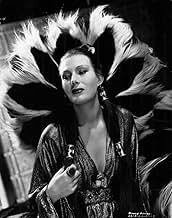IMDb RATING
5.6/10
1.3K
YOUR RATING
Adventurer Marco Polo travels to China, where he finds the Emperor Kublai Khan, court intrigue, danger, and unexpected love.Adventurer Marco Polo travels to China, where he finds the Emperor Kublai Khan, court intrigue, danger, and unexpected love.Adventurer Marco Polo travels to China, where he finds the Emperor Kublai Khan, court intrigue, danger, and unexpected love.
- Directors
- Writers
- Stars
- Awards
- 4 wins total
Robert Greig
- Chamberlain
- (as Robert Grieg)
Richard Alexander
- Ahmed's Aide
- (uncredited)
Reginald Barlow
- Giuseppi - Venetian Business Man
- (uncredited)
Granville Bates
- Venetian Business Man
- (uncredited)
- Directors
- Writers
- All cast & crew
- Production, box office & more at IMDbPro
5.61.2K
1
2
3
4
5
6
7
8
9
10
Featured reviews
Comic book adventures of Polo on a lavish B&W budget...
This is the film that cost LANA TURNER (in a bit role) her eyebrows which never grew back. Other than that, it has no distinction whatsoever except that it provides a nice comic book excursion into the past with lavish sets of Oriental splendor but little else for compensation.
Still, it's watchable enough thanks to the low-key and quietly humorous performance of GARY COOPER (an unlikely choice for the role of the Italian adventurer from Venice). It's also interesting to watch SIGRID GURIE, fascinating in close-ups with Hollywood's brand of Oriental make-up--but an actress who never managed to be more than a passing fancy.
BASIL RATHBONE adds the right touch of menace as Ahmed, the villain of the piece, and ALAN HALE brings his boisterous presence to the role of a man who was afraid of his lecherous wife (BINNIE BARNES) but not afraid to dispose of his enemies in boiling oil.
It gets more laughable as it goes on, but reaches new heights of incredibility with an ending that has Polo making use of explosives to bring down the enemy camp. His final fight to the death with Rathbone, near an open trap door with hungry lions waiting below and vultures overhead, is the stuff of comic book suspense.
If you can suspend all disbelief long enough to enjoy it, it passes the time quickly and entertainingly. A history lesson, it's not.
Still, it's watchable enough thanks to the low-key and quietly humorous performance of GARY COOPER (an unlikely choice for the role of the Italian adventurer from Venice). It's also interesting to watch SIGRID GURIE, fascinating in close-ups with Hollywood's brand of Oriental make-up--but an actress who never managed to be more than a passing fancy.
BASIL RATHBONE adds the right touch of menace as Ahmed, the villain of the piece, and ALAN HALE brings his boisterous presence to the role of a man who was afraid of his lecherous wife (BINNIE BARNES) but not afraid to dispose of his enemies in boiling oil.
It gets more laughable as it goes on, but reaches new heights of incredibility with an ending that has Polo making use of explosives to bring down the enemy camp. His final fight to the death with Rathbone, near an open trap door with hungry lions waiting below and vultures overhead, is the stuff of comic book suspense.
If you can suspend all disbelief long enough to enjoy it, it passes the time quickly and entertainingly. A history lesson, it's not.
Lavish Hollywood entertainment based on the exploits of the 13th-century famed Venetian explorer
Gary Cooper plays the role of Marco , a venetian adventurer , in this all star production of Marco Polo's adventures . Young Marco travels to China to help Kublai Khan fight against rebels, headed by his own assistant , with a new invention : gunpowder . Entertaining motion picture about oriental and medieval feats in superb Black and White cinematography and luxurious scenarios . High budget Hollywood production deals with Marco Polo travels from Venice to Pekin , where he falls in love with the Emperor's daughter . Marco (sympathetic as well laconic Gary Cooper) becomes the first traveler to record his visit to the Eastern court of the Emperor Kublai Khan . Once there he possesses his protection to merchandise between China and Europe but he prefers to seek out for more adventures . There Marco falls for gorgeous Princess Kukachin (Sigrid Gurie) . Kublai (Barbier) is a kindly fellow , but his villain aide Ahmed (Basil Rathbone replaced originally cast John Carradine as the evil of a piece) wants to get rid of Kublai Khan so he can be emperor, and to get rid of Marco Polo so he can marry the princess . But Ahmed sends Marco Polo to the West to fight barbarians led by a Tartar chief called Kaidu (Alan Hale Jr), but he goes back just in time to save the day . The Italian explorer rescues the daughter of the Mongol leader Kublai Khan , and meets a hermit (the prestigious silent actor H.B. Warner) who has invented gunpowder . During his adventures Polo is imprisoned and will suffer numerous dangers , adventures and risks ; besides he'll quickly discover many Chinese invents as coal , ¡ spaghetti! and gunpowder , among others .
It's a spectacular adventure and plenty of emotions , action , romance and evocative musical score from Alfred Newman and Hugo Friedhofer . The picture blends far eastern adventures and medieval scenario . This is one of the most bemusing oriental adventure movies ever made and extremely well produced , lush production design and shot in awesome black and white photography from Archie Stout and Rudolph Mate . This juvenile romp is utterly amusing and entertaining though inexactly based on facts . Don't expect historic accuracy from this typical Hollywood product full of adventures , a love story and lots of action . The notorious producer Samuel Goldwyn were more concerned with offering moving and enjoyable amusement than factual information . However , the picture has some actual events such as the attempt conquest Japan by means a fleet that was sunk by strong winds ,thunders and gale . This marked the screen debut of Samuel Goldwyn's protégé Sigrid Gurie, whom he publicly labeled "the Norwegian Garbo , even though she was born in Brooklyn . In fact , by the time the film was released , it had been discovered Sigrid was born from the rather less exotic place of New York . Look out for Lana Turner in her sixth movie making a short appearance , almost extra , as a slave girl , later she recalled in a Gary Cooper biography that her "fancy black oriental wig" had been glued around her face with spirit gum, while she felt extremely uncomfortable in her costumes .
The motion picture was middlingly directed by Archie Mayo who replaced John Cromwell after a few days due to "differences of opinion on story treatment," according to a press release. The film's producer Goldwyn then attempted to rope in William Wyler for the job , but Wyler wanted nothing to do with it, so Goldwyn persuaded John Ford to take over for a few days until he could find a permanent replacement for Cromwell. Archie Mayo was eventually brought in to finish the picture. The film was received poorly at the box-office, becoming the biggest flop up to that time for both Gary Cooper and Samuel Goldwyn; it was estimated that the picture lost close to $700,000 . The flick will appeal to far eastern saga fanciful and Gary Cooper enthusiasts.
Other pictures based on this legendary character are the followings : ¨Marco Polo (1962)¨ by Hugo Fregonese and Piero Pierotti with Rory Calhoun , Yoko Tani and Robert Hundar ; "Marco the Magnificent" by Raoul Levy with Horst Buchhold, Anthony Quinn , Elsa Martinelli ; ¨Marco¨ (1973) by Seymour Robbie with Desi Aznar Jr , Zero Mostel ; the best results to be ¨Marco Polo¨ TV (1982) by Giuliano Montalvo with Ken Marshall , David Warner , F Murray Abraham , Leonard Nimoy ; ¨The Incredible Adventures of Marco Polo on His Journeys to the Ends of the Earth¨ (1998) with Don Diamant , Jack Palance and Oliver Reed ; and ¨Marco Polo¨ (2007) by Kevin Connor with Ian Somerhalder , BD Wong and Brian Dennehy .
It's a spectacular adventure and plenty of emotions , action , romance and evocative musical score from Alfred Newman and Hugo Friedhofer . The picture blends far eastern adventures and medieval scenario . This is one of the most bemusing oriental adventure movies ever made and extremely well produced , lush production design and shot in awesome black and white photography from Archie Stout and Rudolph Mate . This juvenile romp is utterly amusing and entertaining though inexactly based on facts . Don't expect historic accuracy from this typical Hollywood product full of adventures , a love story and lots of action . The notorious producer Samuel Goldwyn were more concerned with offering moving and enjoyable amusement than factual information . However , the picture has some actual events such as the attempt conquest Japan by means a fleet that was sunk by strong winds ,thunders and gale . This marked the screen debut of Samuel Goldwyn's protégé Sigrid Gurie, whom he publicly labeled "the Norwegian Garbo , even though she was born in Brooklyn . In fact , by the time the film was released , it had been discovered Sigrid was born from the rather less exotic place of New York . Look out for Lana Turner in her sixth movie making a short appearance , almost extra , as a slave girl , later she recalled in a Gary Cooper biography that her "fancy black oriental wig" had been glued around her face with spirit gum, while she felt extremely uncomfortable in her costumes .
The motion picture was middlingly directed by Archie Mayo who replaced John Cromwell after a few days due to "differences of opinion on story treatment," according to a press release. The film's producer Goldwyn then attempted to rope in William Wyler for the job , but Wyler wanted nothing to do with it, so Goldwyn persuaded John Ford to take over for a few days until he could find a permanent replacement for Cromwell. Archie Mayo was eventually brought in to finish the picture. The film was received poorly at the box-office, becoming the biggest flop up to that time for both Gary Cooper and Samuel Goldwyn; it was estimated that the picture lost close to $700,000 . The flick will appeal to far eastern saga fanciful and Gary Cooper enthusiasts.
Other pictures based on this legendary character are the followings : ¨Marco Polo (1962)¨ by Hugo Fregonese and Piero Pierotti with Rory Calhoun , Yoko Tani and Robert Hundar ; "Marco the Magnificent" by Raoul Levy with Horst Buchhold, Anthony Quinn , Elsa Martinelli ; ¨Marco¨ (1973) by Seymour Robbie with Desi Aznar Jr , Zero Mostel ; the best results to be ¨Marco Polo¨ TV (1982) by Giuliano Montalvo with Ken Marshall , David Warner , F Murray Abraham , Leonard Nimoy ; ¨The Incredible Adventures of Marco Polo on His Journeys to the Ends of the Earth¨ (1998) with Don Diamant , Jack Palance and Oliver Reed ; and ¨Marco Polo¨ (2007) by Kevin Connor with Ian Somerhalder , BD Wong and Brian Dennehy .
Watchable but silly
This is the sort of film that usually makes history teachers cringe--after all, this film bears about as much of a resemblance to the life of Marco Polo as it does to Ferdinand Marcos! Part of this is because there is a very limited amount that we actually know about this 13th century adventurer and part of it is because Sam Goldwyn must have realized what we DID know wasn't all that exciting--so, in true Hollywood fashion, the story is almost complete hogwash! Who, other than Hollywood, can make Kublai Khan seem cuddly and sweet--allowing a commoner like Polo to make out with his favorite daughter? The bottom line is after the first 10 minutes of the film, the movie diverges so far from reality it is impossible to believe any of the movie. However, from a purely entertainment point of view, this movie is pretty good--albeit a bit hokey. The story has lots of action, adventure, suspense, White-American people playing Asian roles and a lavish budget. So, provided, of course, you completely suspend disbelief, this is a watchable and entertaining flick.
Absurd version of Marco's adventures
Worthless as biography and not even much of a Gary Cooper adventure film but on a camp level there is entertainment value here. You would think with a tale as rich as Polo's they wouldn't have to fabricate an almost entirely false one but such was Hollywood film making in the 30's.
All the obviously Caucasian women are made up with Jean Harlow eyebrows and dark makeup not for one instance being convincingly oriental. About those eyebrows: within the cast in a small role about an hour in is Lana Turner as a maid/concubine, to prepare her for the role the makeup department shaved off her eyebrows and they never grew back! It wasn't worth the sacrifice she is no more convincing than anybody else. Most absurd is the usually reliable Alan Hale who looks preposterous. There is nothing wrong with his performance except its one that would feel right at home in a western but he is supposed to be a Mongol warlord, so authentic it is not.
Sigrid Gurie, the Siren of the Fjords as she was billed but who was actually born in Flatbush, doesn't make much of an impression as the romantic interest. Binnie Barnes tries to inject some life into the picture and have some fun with her role as Alan Hale's wife but is likewise handicapped by her makeup. Gary Cooper does not look at all like a traveling merchant in the 13th century but like Gary Cooper of course, oddly that's one of the films strengths since even when faced with the unlikely sight of Basil Rathbone as Ahmed a Mongol villain Coop is there to remind you that this is a vehicle for its star and little else.
All the obviously Caucasian women are made up with Jean Harlow eyebrows and dark makeup not for one instance being convincingly oriental. About those eyebrows: within the cast in a small role about an hour in is Lana Turner as a maid/concubine, to prepare her for the role the makeup department shaved off her eyebrows and they never grew back! It wasn't worth the sacrifice she is no more convincing than anybody else. Most absurd is the usually reliable Alan Hale who looks preposterous. There is nothing wrong with his performance except its one that would feel right at home in a western but he is supposed to be a Mongol warlord, so authentic it is not.
Sigrid Gurie, the Siren of the Fjords as she was billed but who was actually born in Flatbush, doesn't make much of an impression as the romantic interest. Binnie Barnes tries to inject some life into the picture and have some fun with her role as Alan Hale's wife but is likewise handicapped by her makeup. Gary Cooper does not look at all like a traveling merchant in the 13th century but like Gary Cooper of course, oddly that's one of the films strengths since even when faced with the unlikely sight of Basil Rathbone as Ahmed a Mongol villain Coop is there to remind you that this is a vehicle for its star and little else.
Movie Not History, But Neither Was Polo
I don't have much to say about the film; it's another pretty, but merely adequate Hollywood hoo-hoo. But - although the film (of course) plays loose with historical fact - it must be remembered that Marco Polo did it as well, and there is almost no actual record to compare anyone's version of the story against: Polo (like Cellini) was a notorious liar-in-print. It is now assumed that his record of his journey is quite spurious, and written to enhance the glory of his accomplishment. As there is no other extensive record of the journey, there can be precious little "truth" or "fiction" to be be determined about any Marco Polo narrative. Like Cellini, he has "pre-dramatized" his own story.
Did you know
- TriviaThe film did poorly at the box-office, becoming the biggest flop up to that time for both Gary Cooper and Samuel Goldwyn; it was estimated that it lost close to $700,000.
The film was criticized for many reasons but chief among them was the casting of Gary Cooper in the lead role - many felt the part called for a brash, swashbuckling hero rather than the low-key cowboy persona that Cooper exemplified. It is interesting to note, then, the man who first brought the idea to Goldwyn: swashbuckler extraordinaire Douglas Fairbanks.
- GoofsWhen Marco crosses a bridge, his party is attacked and his horse is driven over a cliff. A safety wire is clearly visible on the rider.
- Quotes
Chen Tsu: You have never seen food like this before?
Marco Polo: No. What is it? Snakes?
Chen Tsu: No! No, it has been eaten by the poor people in China for generations. We call it 'spah- get'.
- Crazy creditsOpening credits prologue: FOREWORD: Marco Polo lived in Venice seven hundred years ago. He was the first European to visit China and write the story of his adventures in that land of magic and mystery.
He was also the first traveling salesman. . . . . . .
- ConnectionsFeatured in History Brought to Life (1950)
- How long is The Adventures of Marco Polo?Powered by Alexa
Details
Box office
- Budget
- $2,000,000 (estimated)
- Runtime
- 1h 44m(104 min)
- Aspect ratio
- 1.37 : 1
Contribute to this page
Suggest an edit or add missing content


